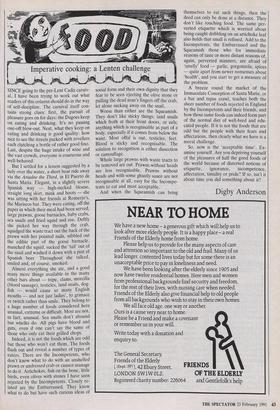Imperative cooking: a Lenten challenge
JL
SINCE going to the pre-Lent Cadiz carniv- al, I have been trying to work out what readers of this column should do in the way of self-discipline. The carnival itself con- tains strong clues: first, the pursuit of pleasure goes on for days: the Dagoes keep on eating and drinking. It's no passing one-off blow-out. Next, what they keep on eating and drinking is good quality: how nice to see the streets packed with revellers each clutching a bottle of rather good fino. Last, despite the huge intake of wine and the vast crowds, everyone is courteous and well-behaved.
But I settled for a lesson suggested by a lady over the water, a short boat ride away via the Ariadne the Third, in El Puerto de Santa Maria. Elegant, in a slightly severe Spanish way — high-necked blouse, straight long skirt, mink and boots — she was sitting with her friends at Romerjo's, the Mariscos bar. They were eating, off the paper in which their meal had been served, large prawns, goose barnacles, baby crabs, sea snails and fried squid and roe. Deftly she picked her way through the crab, squidged the waste tract out the back of the prawn with her pointed nails, nibbled out the edible part of the goose barnacle, munched the squid, sucked the 'tail' out of the snail and washed it down with a pint of Spanish beer. Throughout she talked, smiled and, of course, smoked.
Almost everything she ate, and a good many more things available in the many other bars about — tripe, clams, morcilla (blood sausage), testicles, land snails, dog- fish — would cause so many English mouths — and not just ladies', to grimace or twitch rather than smile. They belong to a huge number of foods considered here unusual, extreme or difficult. Most are not, in fact, unusual. Sea snails don't abound but whelks do. All pigs have blood and guts, even if one can't say the same of those who only eat their grilled chops. Indeed, it is not the foods which are odd but those who won't eat them. The foods flush out and reveal a number of types of eaters. There are the Incompetents, who don't know what to do with an unshelled prawn or undressed crab or cannot manage to do it. Artichokes, fish on the bone, little birds, even olives with stones I have seen rejected by the Incompetents. Closely re- lated are the Embarrassed. They know what to do but have such curious ideas of social form and their own dignity that they fear to be seen ejecting the olive stone or pulling the dead man's fingers off the crab, let alone sucking away on the snail.
Worse than either are the Squeamish. They don't like sticky things; land snails which froth at their front doors, or eels; anything which is recognisable as part of a body, especially if it comes from below the waist. Most offal is out, testicles, feet. Blood is sticky and recognisable. The solution to recognition is either dissection or camouflage.
Whole large prawns with waste tracts to be removed are out. Prawns without heads are less recognisable. Prawns without heads and with some ghastly sauce are not recognisable at all, easy for the Incompe- tents to eat and most acceptable.
And when the Squeamish can bring themselves to eat such things, then the deed can only be done at a distance. They don't like touching food. The same per- verted etiquette which is worried about being caught dribbling on an artichoke leaf also holds that small is refined. Add to the Incompetents, the Embarrassed and the Squeamish those who for immediate reasons of taste or more distant reasons of, again, perverted manners, are afraid of 'smelly' food — garlic, gorgonzola, spices — quite apart from newer nonsenses about 'health', and you start to get a measure of the problem.
A breeze round the market of the Immaculate Conception of Santa Maria, or a bar and tapas crawl, teaches both the sheer number of foods rejected in England by the Incompetents and their friends, and how those same foods can indeed form part of the normal diet of well-bred and edu- cated people. If it is not the foods that are odd but the people with their fears and affectations, then clearly what we have is a moral challenge.
So, now is the 'acceptable time'. Ex- amine yourself. Are you depriving yourself of the pleasures of half the good foods of the world because of distorted notions of etiquette, ignorance, incompetence, affectation, timidity or pride? If so, isn't it about time you did something about it?
Digby Anderson


















































 Previous page
Previous page